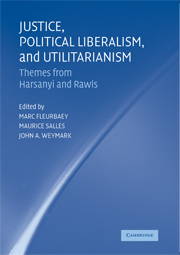Book contents
- Frontmatter
- Contents
- Preface
- List of Contributors
- 1 An Introduction to Justice, Political Liberalism, and Utilitarianism
- PART ONE THEMES FROM RAWLS
- PART TWO HARSANYI'S IMPARTIAL OBSERVER AND SOCIAL AGGREGATION THEOREMS
- PART THREE GOODNESS AND WELL-BEING
- 9 Can There Be a Preference-Based Utilitarianism?
- 10 Harsanyi, Rawls, and the Search for a Common Currency of Advantage
- 11 Utilitarianism versus Fairness in Welfare Economics
- 12 Rationality and Want-Satisfaction
- PART FOUR SHARING THE GAINS FROM SOCIAL COOPERATION
- PART FIVE RIGHTS AND LIBERTIES
- Index
10 - Harsanyi, Rawls, and the Search for a Common Currency of Advantage
Published online by Cambridge University Press: 09 February 2010
- Frontmatter
- Contents
- Preface
- List of Contributors
- 1 An Introduction to Justice, Political Liberalism, and Utilitarianism
- PART ONE THEMES FROM RAWLS
- PART TWO HARSANYI'S IMPARTIAL OBSERVER AND SOCIAL AGGREGATION THEOREMS
- PART THREE GOODNESS AND WELL-BEING
- 9 Can There Be a Preference-Based Utilitarianism?
- 10 Harsanyi, Rawls, and the Search for a Common Currency of Advantage
- 11 Utilitarianism versus Fairness in Welfare Economics
- 12 Rationality and Want-Satisfaction
- PART FOUR SHARING THE GAINS FROM SOCIAL COOPERATION
- PART FIVE RIGHTS AND LIBERTIES
- Index
Summary
The aim of welfare economics is to evaluate alternative allocations of resources, or alternative economic institutions, in terms of their impact on people's well-being or interests. One classic line of approach is to look for what I shall call an interpersonal common currency of advantage – a measure which integrates all aspects of a person's well-being or interests or opportunities (or, on some more modest accounts, all “economic” aspects of one of these) and which permits interpersonal comparisons. In this chapter, I review some attempts to find such a common currency, focusing particularly on the work of John Harsanyi and John Rawls. I argue that Harsanyi's ambitious and economically sophisticated attempt fails. In contrast, Rawls's general strategy is sound, but he offers only a rough sketch of how it might be translated into welfare economics. I make some suggestions about how Rawls's approach might be extended to generate a common currency of advantage. The basic idea is to construct a money metric of economic opportunity.
The Common Currency of Pleasure
I have said that this chapter is about the search for a common currency of advantage. Advantage is a shorthand expression I shall use to represent any conception of what makes a life good for a person, or of what provides a person with the opportunity for a good life, and which is deemed to be relevant for some problem of social choice. I realize that advantage is a clumsy term, but I cannot think of a better one that is sufficiently general to encompass both the actual attainment of desirable states of affairs (which is often called well-being) and the opportunity to attain such states.
- Type
- Chapter
- Information
- Justice, Political Liberalism, and UtilitarianismThemes from Harsanyi and Rawls, pp. 239 - 262Publisher: Cambridge University PressPrint publication year: 2008
- 1
- Cited by



